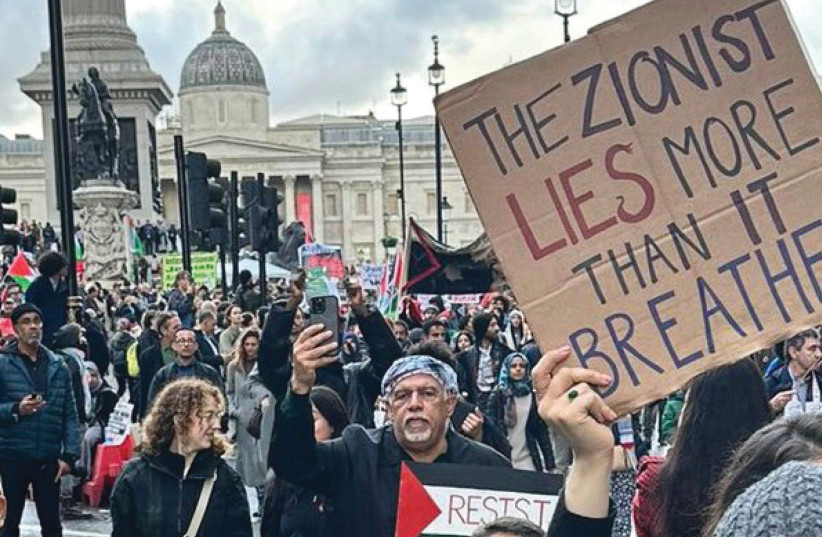One of my children is traveling to the UK shortly to visit family and friends and I’m a little apprehensive about it, such is the appalling rise in antisemitism that has gripped the country as a whole since October 7.
“For the first time ever, antisemitic incidents were recorded in every single police region in the UK,” states the Community Security Trust (CST) in their Antisemitic Incidents Report 2023, published last week.
The report also states that an alarming “4,103 instances of anti-Jewish hate [were] recorded across the UK in 2023... the highest annual total ever reported.”
I’ve already written extensively about this issue, which raised its ugly head while the Hamas atrocities on October 7 were actually being carried out.
“The first incident inspired by Hamas’s attack was reported to CST at 12:55 p.m. on 7 October, when a vehicle drove past a synagogue in Hertfordshire with a Palestinian flag attached, windows wound down and an occupant shaking their fist in the air towards the synagogue where congregants were celebrating the festival of Simhat Torah,” the report states.

This alarming incident, which began weeks before a single Israeli soldier had even stepped foot inside Gaza, indicated “that it was a celebration of Hamas’s attack, rather than anger towards Israel’s military response in Gaza...” which was the cause, according to CST.
This event set the tone of fear for British Jews who have faced antisemitic rhetoric and attacks since then. “In the week following 7 October, CST recorded 416 anti-Jewish hate incidents, higher than any subsequent week,” the report continued.
Britain's racist tendencies toward Jews
These troubling statistics demonstrate that swaths of people in the United Kingdom harbored racist tendencies toward Jews before the Hamas attack took place on October 7 – they were simply waiting for an excuse to unleash their bigoted views. As a result, British Jews across the UK have been left with a profound sense that nowhere are they safe. “It occurs in schools, universities, workplaces, on the streets, and all over social media. Our community is being harassed, intimidated, threatened, and attacked,” said CST CEO Mark Gardner.
London and Manchester have been worst hit by this ugly phenomenon where intimidating pro-Palestine marches take place on a regular basis and Jews are targeted simply for being Jewish.
In Central London, for example, a group of Israelis were set upon after being identified as such by speaking Hebrew. Similar incidents have also occurred in Manchester, where a rally in support of Israel was disrupted by people shouting at the peaceful demonstrators.
So, is it safe for Israelis to travel to the UK right now? Or should warnings be heeded and precautions taken to avoid any conflict before setting foot on England’s green and pleasant land? I had this discussion with my son before he set off on his trip.
While any holiday should be planned carefully, with safety being the priority, Jews, and Israelis in particular, have to take extra care. No longer can we wander around, openly wearing kippot while chatting away in Hebrew, oblivious to our surroundings. Staying alert and safe is crucial which, sadly, means special attention must be paid to certain aspects of the trip, depending on where you’re headed.
In Britain, serious consideration must be given when traveling around the country. Taking an Uber (taxi), for example, may not be as straightforward as you’d imagine. Stories about Uber drivers have been circulating since the Hamas attack on October 7 took place. Some have been known to make their views on the war in Gaza clear, leaving their passengers, especially Jewish ones, uncomfortable.
Consequently, it may not be wise to use this form of transport, or if one must, take care when doing so by removing or hiding any outward signs of being Jewish. Similarly, when walking through city centers at the weekend, one should either avoid areas where the pro-Palestine marches are taking place or else take care to keep your Jewish/Israeli identity hidden.
And if asked where you’re from, err on the side of caution. While it may be uncomfortable to lie about being Jewish and/or Israeli, this may be the lesser of two evils if the alternative provokes an aggressive response – particularly as the police are unlikely to step in to help you, if past experience is anything to go by.
While you may think that this advice is shocking, the sad fact remains that the situation for Jews in the UK is concerning. With Jew hate no longer taboo and anti-Israel sentiment at an all-time high, those who had previously kept their bigoted views under wraps are out and proud. Many chant their hateful rhetoric on their weekly marches in full view of the police, who willfully turn a blind eye, while others launch unprovoked attacks against Jews on the streets of Britain.
For some, the Hamas terrorist attack on October 7 has simply provided a vehicle through which they can channel their Jew-hate.
Consequently, many Jews now face the delicate balance of trying to stay out of harm’s way while not hiding or even denying their identity.
Ultimately, while there are no good choices, staying safe on the streets of Britain must remain a priority for all.
The writer is a former lawyer from Manchester, England. She now lives in Israel where she works at The Jerusalem Post.
